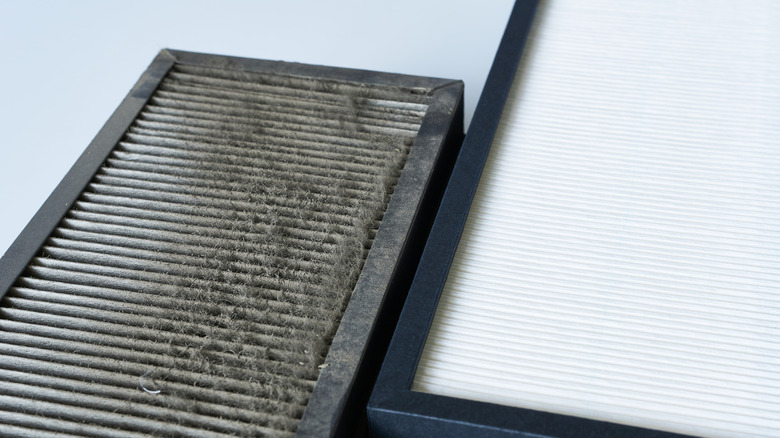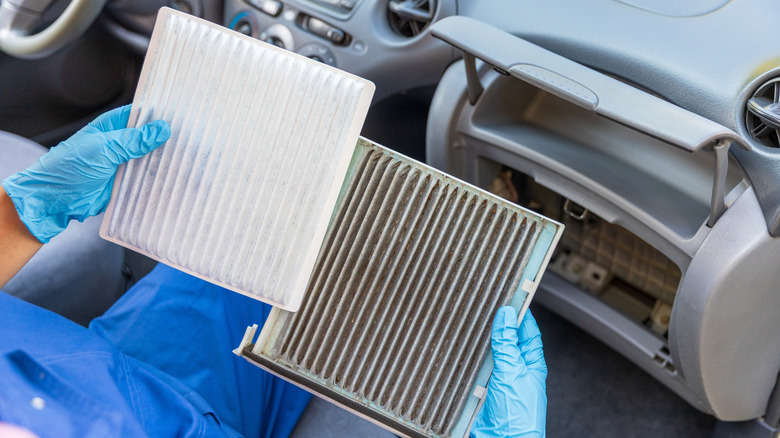Each time you take to the streets, your vehicle’s intake system draws in air laden with dirt, pollen, insects, and various particles. This is when the engine air filter plays its crucial role, serving as the initial barrier against contaminants that could clog the combustion chambers and possibly diminish efficiency. By doing so, it maintains cleanliness, ensuring smooth airflow into the engine, optimal fuel consumption, and peak performance. Without it, you may experience lagging throttle reactions, subpar acceleration, or even progressive damage to the engine over time.
Currently, it’s important to point out that
Your vehicle actually comes with two kinds of air filters.
Not to be mistaken for the engine air filter, there’s another component called the cabin air filter which purifies the air flowing into your car’s inside via the HVAC system. Its main purpose is to protect you and your occupants from pollutants, allergens, and unwanted smells. However, our attention will primarily be on the engine air filter today because it significantly impacts your vehicle’s performance and durability.
Read more:
6 Stylish and Practical Devices for Your Vehicle’s Console
Can Inexpensive Air Filters Impact Engine Performance?

To determine whether more expensive engine filters actually matter,
The Drive tested five different filters.
in an
eighth-gen Honda Civic Si
It was indeed a thorough dynamometer test carried out with the help of a ProHub Dynamometer. The participants included a pre-owned Denso filter priced at $9.84, a brand-new Honda Original Equipment Manufacturer (OEM) filter for $17.74, an extremely budget-friendly Ultra 8 model costing $8.99, the highly favored aFe Power Pro Dry S option which retails for $78.40, and finally, the top-tier Spoon Sports variant valued at $90. The objective here was to determine whether any of these air filters had the potential to enhance the output of horsepower or torque in a nearly standard K20Z3 engine.
Every filter type has its specific characteristics. Lower-cost models typically consist of simple paper or synthetic components and guarantee adequate filtering capabilities suitable for regular driving conditions. Premium options such as those offered by brands like aFe and Spoon incorporate washable dry mediums along with high-performance configurations designed to enhance air intake efficiency and durability. Others, including oil-soaked cotton gauze variants similar to what you’d find from manufacturers like K&N, claim superior airflow but necessitate routine upkeep and meticulous care to prevent clogging detectors.
After analyzing the data, it became evident that none of the filters had a substantial impact on engine performance. Interestingly, the least expensive option—the Denso filter—led with 177.0 hp. Following closely was the Honda OEM model, registering 176.7 hp. Meanwhile, both the high-end aFe and Spoon Sports filters stayed close to this mark at approximately 175 hp each. Torque readings also remained tightly clustered, indicating that when using an unmodified engine paired with the original airbox, the choice of filter doesn’t significantly affect overall performance metrics.
However, Not Every Detail Is Centered Around the Performance.

Even if you aren’t focused on metrics, the effectiveness of your filter significantly impacts how your engine ages and how frequently it needs maintenance.
make replacements
Inexpensive filters, such as simple paper models, suffice for brief periods or occasional driving. However, these often get blocked quickly and deteriorate rapidly, necessitating more regular changes. On the other hand, premium filters, including dry synthetics or reusable cotton varieties, generally provide superior filtering, greater dust retention capabilities, and extended usage times. As a result, you may make fewer visits to the auto supply shop, produce less waste destined for landfills, and ensure steady air flow into your engine over prolonged durations.
Additionally, consider the impact of environmental factors. When frequently traveling through regions with significant dust, air pollution, or construction particles, investing in a sturdier filtration system can safeguard both your engine and respiratory health. This type of filter may prolong the lifespan of crucial parts like the MAF sensor, throttle body, and others. To explore leading manufacturers providing premium quality filters, take a detailed look at their offerings.
check out our list
.
The atmosphere inside the cabin is also crucial, and the choice of cabin filter can significantly affect your well-being and comfort. High-end cabin filters featuring HEPA material or activated carbon layers prove particularly beneficial for individuals suffering from allergies, asthma, or frequently driving in urban areas with low air quality. These advanced filters are capable of capturing allergens like pollen, pollutants such as smog, along with mold spores and bacteria.
Interested in keeping up with the newest technology and automotive developments?
Sign up for our complimentary email newsletter.
For the most recent news stories, detailed guides, and step-by-step advice, delivered once per email.
Read the
original article on newsinpo.space
.


